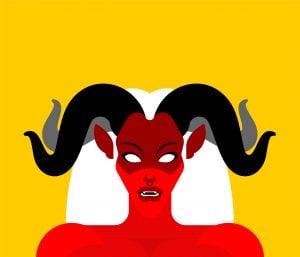Nike Claims Custom Satan Shoe Maker Is Putting It Through Hell
It is not clear, as Nike wants the court to conclude, that MSCHF is in any way attempting to capitalize on Nike's valuable reputation and customer goodwill by using Nike's marks on the shoes.
 Can sneakers be customized by the purchasers and then resold for gain? A new lawsuit initiated by Nike may require the trier of fact to answer that somewhat novel question.
Can sneakers be customized by the purchasers and then resold for gain? A new lawsuit initiated by Nike may require the trier of fact to answer that somewhat novel question.
On March 29, Nike filed a complaint against MSCHF Product Studio, Inc. after the company, in collaboration with recording and performing artist Lil Nas X, customized Nike Air Max 97 shoes to prominently feature a satanic theme, selling the shoes as “Satan Shoes.” Nike is not connected to the project and is not pleased by the altered products, each of which bears a single drop of human blood, which Nike claims will likely cause confusion with and dilution to the Nike brand.
Nike says that it initiated litigation to maintain control of its brand, stating that it should be able to decide what products to put its trademarked swoosh on as opposed to a third-party like MSCHF having that type of decision-making authority. Part of the request for relief is for MSCHF to be immediately and permanently enjoined from fulfilling orders of the customized Satan Shoes. Meanwhile, Lil Nas X continues to tweet about the customized kicks.

Legal AI: 3 Steps Law Firms Should Take Now
To its credit, Nike did highlight consumer confusion and apparent dilution in its complaint. Nike included screenshots from commenters, beginning on page 11 of the complaint, saying that they will never buy Nike again and that it is disgusting for Nike to have any part in this effort to sell Satan Shoes. Is it an issue with MSCHF not doing a good enough job to provide disclosures that Nike is not in any way affiliated with the shoes, is it the fault of the media for not highlighting the distinction, or something else?
On the other hand, MSCHF does not seem to be using the Nike word mark in its advertising and promotion. Instead, it wisely called the sneakers Satan Shoes as opposed to Nike Satan Shoes, which would have certainly added legal exposure to the company. Furthermore, creating art out of the base Nike products could certainly be claimed as transformational use of the shoes, which could add to a fair use defense that MSCHF will certainly be bringing in the pending case. Working against MSCHF is the fact that it is commercializing the transformative products for profit.
It is not clear, as Nike wants the court to conclude, that MSCHF is in any way attempting to capitalize on Nike’s valuable reputation and customer goodwill by using Nike’s marks on the shoes. MSCHF could simply like the shoes and not at all be seeking to cause confusion in the marketplace, but MSCHF’s intent would only be an element that goes to the amount of type of damages as opposed to whether the company is liable for trademark infringement and/or dilution.
Sponsored

Is The Future Of Law Distributed? Lessons From The Tech Adoption Curve

The Business Case For AI At Your Law Firm


Legal AI: 3 Steps Law Firms Should Take Now

Is The Future Of Law Distributed? Lessons From The Tech Adoption Curve
Darren Heitner is the founder of Heitner Legal. He is the author of How to Play the Game: What Every Sports Attorney Needs to Know, published by the American Bar Association, and is an adjunct professor at the University of Florida Levin College of Law. You can reach him by email at heitner@gmail.com and follow him on Twitter at @DarrenHeitner.
Sponsored

Early Adopters Of Legal AI Gaining Competitive Edge In Marketplace








